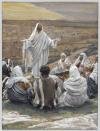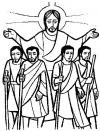
Commentary to the 29th Sunday in Ordinary Time-Year C
Prayer must not be a way to force God to do our will. Why are we invited to turn to him persistently? What is the meaning of prayer? To these questions, Jesus responds today with a parable (vv. 1-5) and with application to the community's life (vv. 6-8). The parable starts with the presentation of personages.

















.jpg)


